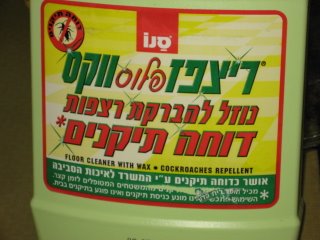The man says, "I make a good living."
Israelis self- empower themselves by creating personal space through the facilitation of the use of automobile alert klaxons. Or, for those of you who did not attend university after 2001: Israelis love to honk their God-damned car horns.
Cabs will honk at you. Out for a 6 am run with iPod in hand and ears, running shoes on, sweat pouring down your back, water bottle and fanny pack in place? Cabs will still honk. They will honk even as you enter your house, as if to say “Allo! Pay me 9 shekel for driving you the last 2 meters up the sidewalk to your door. B'seder?” Are they so fastidious in making sure their horn works? You might think so, because in fact, cabs will honk at your even when they have a car full of customers going to another city.
Cabs are just the warm-up. Regular Israeli drivers are the real masters of the honk here. Has that car in front of you been at the intersection for more than 0.32 seconds?
*Honk!*
Did a mail truck stop to make a delivery? How dare they!
*Honk!*
Is an elderly nun standing on the opposite side of the road? That’s right,
*Honk!*
Are you crossing against the light?
Are you crossing with the light?
Are you not even crossing at all? Just eating schwarma?
*Honk!* *Honk!* *Honk!*
Is the van full of Police not pulling halfway into the crowded intersection, just so (as I saw this morning) you can make a right hand turn? If your license plate is 90-342-0902, than the answer is *Honk!*
Now in the US of A, honking at an officer of the peace is a way of stating “Sir or Madam, I have far to much money! Please give me a citation for a traffic violation so that I may better the civic welfare by $235 dollars.” But here in the State of Israel, the Police van just pulls into the intersection, blocks a lane of traffic, and the car behind tears into the right turn like a student at a Chabad cheyder digs into the last pot of fleischig cholent at Kiddush.
If you put an Israeli in the driver’s seat of a car, take a way the keys and have him/her sit there, they will just honk at random within 30 seconds. Better make that 10 seconds. Which raises the question: are Israeli roads so dangerous because people are so busy honking at everything that moves?
HONK! Sorry, you took too long to answer.
---------------------------------
No Orthodox Siddur has Tefilah L’nahag - a Prayer for the Driver- something needed very badly here. The Masorti siddur, thank God, does have such a tefilah, by R. Michael Graetz.
Our God and God of our ancestors, God of Abraham and Sarah,
God of Isaac and Rebecca, God of Jacob, Rachel and Leah;
May we reach our destination in peace, and return in peace to our homes. Imbue me with the will to discern that every human is created in your image, and that saving one person is like saving an entire world.
Grant me the wisdom to understand that nothing is more precious than human life,
neither time,
nor money,
neither honor nor revenge.
(The full prayer- in Hebrew and English, is here.)









